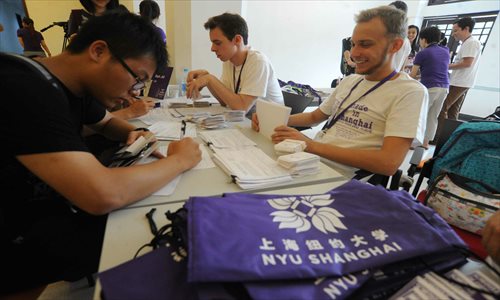US colleges offer local courses in effort to retain Chinese students
By Qi Xijia and Huang Lanlan Source: Global Times Published: 2020/8/3 23:03:40

Freshmen students register for classes at New York University Shanghai Sunday at its temporary home within East China Normal University (ECNU). The students will study at ECNU for a year before moving to NYU Shanghai's permanent campus, which is still under construction in Pudong New Area. Photo: Yang Hui/GT
US colleges are offering local education programs for Chinese students who are unable or unwilling to travel abroad amid the surging coronavirus outbreak and escalating US-China tensions to secure a market they cannot afford to lose. However, whether students will take up this offer remains to be seen, experts said.
The US used to be an attractive place for Chinese students and was the top overseas study destination but given its current poor handling of the coronavirus outbreak and travel restrictions, many Chinese students are considering other options.
International students contributed nearly $41 billion to the US economy in the 2018-2019 academic year, according to the NAFSA: Association of International Educators, and one-third of that figure was contributed by students from China.
The number of Chinese students totaled 369,548, accounting for 33.7 percent of all international students in the 2018-2019 semester, making the country the biggest source of international students in the US, according to data from the Institute of International Education.
But the numbers have been falling due to the surging coronavirus in the US, more restrictive student visa policies and the unfriendly attitude of the US government toward international students.
More than 50 percent of 520 higher education institutions in the US said they saw a year-on-year decrease in the number of applications from international students for the upcoming academic year and roughly 18 percent of them said they saw a "substantial decline" in applications, according to a survey by the International Institute of Education in July.
The potential drop in international students, especially Chinese students, is a headache for Western colleges, many of which rely heavily on the income from international student fees. So the colleges are making efforts to allow students to enroll and study without leaving China.
New York University (NYU), Pennsylvania State University (Penn State), Cornell University, Duke University, Syracuse University, University of Pittsburgh, and several other US colleges have developed plans with Chinese partners to allow students to study starting this fall.
NYU announced a "Go Local" program in mid-July. According to the program, its Shanghai campus will be hosting some 2,300 Chinese undergraduates and 800 graduate students who are currently in China and are unable or prefer not to travel to the US for the fall semester.
The additional 3,100 students will be taught in person at both the NYU Shanghai campus and in WeWork spaces converted into classrooms. They will be allowed to take online classes offered by their home campuses, according to a reply provided by NYU Shanghai to the Global Times.
Penn State is offering a 17-week academic program in Shanghai for Chinese freshmen students during the fall 2020 semester.
"Chinese students make up roughly half of our incoming international students," Rodger Brindley, vice provost for Global Programs at Penn State told the Global Times via an e-mail reply.
As of end-July, the university had nearly 1,000 Chinese undergraduate students who are enrolled in coursework on campus or through remote delivery of courses for the fall semester, which remains steady and comparable to last year.
Brindley said the decision to offer the classes is partly a result of the US' travel restrictions imposed amid the pandemic as well as delays in processing visas due to pandemic-related limitations.
"We recognized the US embassies and consulates were closed around the world, and our Chinese students would not be able to secure visas in time to travel to the US," he said.
"There has been a significant response, and we are delighted that well over 400 new Penn State first-year students will join us for a residential campus experience this fall."
The efforts by the US colleges make sense to Ji Hong, a research fellow at the Institute of American Studies of the Chinese Academy of Social Sciences.
"They are unwilling to lose the Chinese market, which they are highly dependent on for income," she told the Global Times.
US universities are trying hard to retain their Chinese students, although they have become less attractive to Chinese youngsters because of the serious domestic epidemic situation and the Trump administration's unfriendly policies toward China, Ji said.
The US' constant shift in policies and rules has been creating a lot inconvenience and barriers for international students, experts said.
The US Immigration and Customs Enforcement (ICE) announced earlier in July that international students may need to leave the US if their universities switch to online-only classes for the fall semester. The rules were rescinded after Harvard and MIT took the ICE to court.
The students from China will also have to be quarantined in a third country before entering the US as the US travel ban says that foreign nationals who have been in China during the past 14 days may not enter the US.
Although the US universities have offered local education plans for Chinese students to mitigate the impact of the policies and advocated for these students in many ways, it may still be difficult to satisfy the Chinese students and their families, Ji said.
"In some cases, universities ask international students to pay equal tuition fees for their localized projects, which may exacerbate the students' discontent," she said.
RELATED ARTICLES:
Posted in: IN-DEPTH